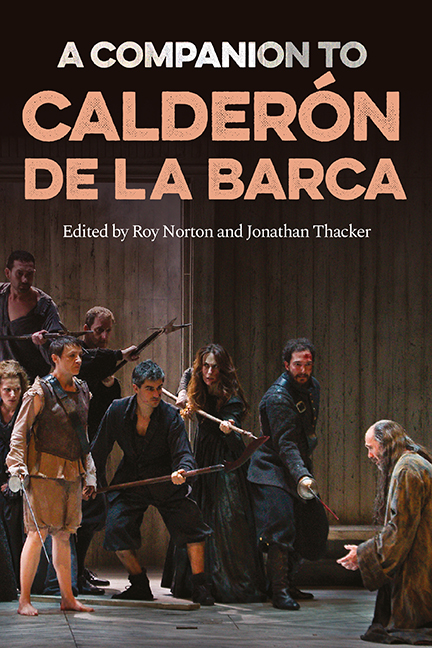Book contents
- Frontmatter
- Dedication
- Contents
- List of Illustrations
- List of Contributors
- Acknowledgements
- List of Abbreviations
- Introduction
- 1 Biography and Context
- 2 The Calderonian World
- 3 The Playwright’s Craft: Calderón and the Great Theatrical World of Early Modern Spain
- 4 La vida es sueño
- 5 The Honour Plays of Calderón
- 6 Calderón, the Comedian
- 7 Mythological Court Spectacle Plays
- 8 Religious comedias
- 9 Calderón’s ‘Sacramental, Allegorical and Historical’ autos
- 10 Calderón’s graciosos
- 11 Calderón and Visual Art
- 12 The Staging of Calderón’s Theatre
- 13 Calderón’s European Reception from Romanticism to the Twentieth Century
- 14 The Reception of Calderón in the Hispanic World
- Appendices
- Consolidated Bibliography
- Index
- Tamesis • Companions
5 - The Honour Plays of Calderón
Published online by Cambridge University Press: 07 October 2022
- Frontmatter
- Dedication
- Contents
- List of Illustrations
- List of Contributors
- Acknowledgements
- List of Abbreviations
- Introduction
- 1 Biography and Context
- 2 The Calderonian World
- 3 The Playwright’s Craft: Calderón and the Great Theatrical World of Early Modern Spain
- 4 La vida es sueño
- 5 The Honour Plays of Calderón
- 6 Calderón, the Comedian
- 7 Mythological Court Spectacle Plays
- 8 Religious comedias
- 9 Calderón’s ‘Sacramental, Allegorical and Historical’ autos
- 10 Calderón’s graciosos
- 11 Calderón and Visual Art
- 12 The Staging of Calderón’s Theatre
- 13 Calderón’s European Reception from Romanticism to the Twentieth Century
- 14 The Reception of Calderón in the Hispanic World
- Appendices
- Consolidated Bibliography
- Index
- Tamesis • Companions
Summary
‘Reputation is an idle, and most false imposition; oft got without merit, and lost without deserving.’ (Shakespeare, Othello)
Generations of students of the honour plays of Calderón have been encouraged to interpret them in the light of the Spanish honour code, an inflexible social system rooted in the laws of the time, which permitted husbands to murder their wives on mere suspicion of infidelity. In El médico de su honra [The Physician of his Honour, early 1630s], A secreto agravio, secreta venganza [Secret Vengeance for Secret Offence, 1635], and El pintor de su deshonra [The Painter of His Dishonour, late 1640s] wives who have not committed adultery are murdered by husbands who suspect that they have, in order to restore their reputations in the eyes of society. In El alcalde de Zalamea [The Mayor of Zalamea, early 1640s] the daughter of a rich peasant is brutally raped by an army officer and must end her days in a convent. According to the traditional approach, the honour code explains why these plays worked as they did and why they end as they do.
In his dictionary of 1611 Sebastián de Covarrubias defined the two Spanish words ‘honor’ and ‘honra’ in identical terms: ‘reverencia, cortesía que se haze a la virtud, a la potestad’ [the respect and courtesy given to virtue, power]. Over a century later the Diccionario de Autoridades attributes the same meaning to ‘honra’ but ‘honor’ is ‘honra con esplendor y publicidad’ [honour with a public display of splendour]. Honour, therefore, is acquired by the practice of virtue or attends those who exercise power. In the drama of the period, by contrast, it has more to do with a man's reputation in the eyes of his peers or superiors and is closely associated with the sexual purity of wives and daughters: ‘ningún hombre es honrado en sí mismo / que del otro recibe la honra un hombre’ [no man is honourable in himself, he receives honour from someone else]. In other plays by Lope de Vega, such as Fuenteovejuna and Peribáñez, aristocratic villains treat it as a matter of class entitlement: noblemen possess honour, peasants cannot, therefore noblemen can treat peasants as they wish, including attempting to rape them.
- Type
- Chapter
- Information
- A Companion to Calderón de la Barca , pp. 90 - 109Publisher: Boydell & BrewerPrint publication year: 2021



